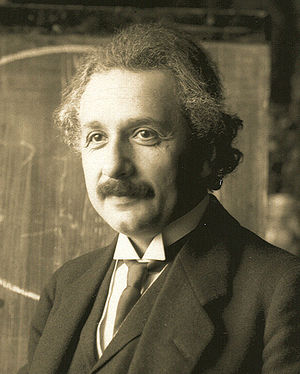As a result of Akkad's expansion throughout the eastern hemisphere and the survival of the Roman Empire, many important people in the OTL have had much different destinies.
E[]

Albert Einstein, Chief Nuclear Scientist for the Roman Nuclear Program.
Albert Einstein[]
Albertus Einstein (14 March 1879 – 18 April 1955) was a Roman theoretical physicist who helped develop the Roman nuclear weapons program.
Albertus Einstein was the President of the Roman Physical Society when the Roman government approached him to help develop a nuclear weapons program in 1918. It had been theorized that Americae, an ally of Akkad, was developing atomic bombs in conjunction. If such weapons were to fall into Akkadian hands, Rome could easily be obliterated. Einstein gladly accepted the job in order to protect Rome.
After the first atomic bomb test in 1923 that took place in rural Germaniam, the nuclear arms race began. By the time of Einstein's death, the Roman nuclear weapons stockpile had reached 500, and he was hailed as a national hero. Einstein, Founder of Nuclear Fission, a statue erected in Einstein's hometown of Ulm, is one of the tallest statues in the world, reaching 125 meters tall.
J[]

Jesus, an unimportant casualty out of many.
Jesus[]
Jesus (7 BCE) was a child from Judea that was one of the many killed during the Akkadian Purge of Judea during the Akkadian-Roman War.
M[]

Muhammad, the prophet of Islam.
Muhammad[]
Abū al-Qāsim Muḥammad ibn ʿAbd Allāh ibn ʿAbd al-Muṭṭalib ibn Hāshim, commonly known simply as Muhammad, was a religious leader from Mecca who was the prophet of the Islam, the third largest religion in the world. He is believed by Muslims to be a messenger and prophet of God. Muhammad is almost universally considered by Muslims as the last prophet sent by God for mankind. While non-Muslims regard Muhammad to have been the founder of Islam, Muslims consider him to have been the restorer of an unaltered original monotheistic faith of Adam, Noah, Abraham, and other prophets.
Born in about 570 CE in the Akkadian city of Mecca, Muhammad was orphaned at an early age and brought up under the care of his uncle Abu Talib. He later worked mostly as a merchant, as well as a shepherd, and was first married by age 25. Being in the habit of periodically retreating to a cave in the surrounding mountains for several nights of seclusion and prayer, he later reported that it was there, at age 40, that he received his first revelation from God. Three years after this event Muhammad started preaching these revelations publicly, proclaiming that "God is One", that complete "surrender" to Him (literally islām) is the only way (dīn) acceptable to God, and that he himself was a prophet and messenger of God, in the same vein as other Islamic prophets.
Muhammad gained few followers early on, and was met with hostility from some Meccan tribes. To escape persecution, Muhammad sent some of his followers to Socotra, a rather uncontrolled area of Akkad, before he and his followers in Mecca migrated to Medina (then known as Yathrib) in the year 622. This event, the Hijra, marks the beginning of the Islamic calendar, which is also known as the Hijri Calendar. In Medina, Muhammad united the tribes under the Constitution of Medina. After eight years of fighting with the Meccan tribes, his followers, who by then had grown to 10,000, threatened to invade the city of Mecca. The King of Akkad decided to allow Islam to flourish, believing that polytheism would eventually trump said monotheistic faith and that putting Mecca in danger would hurt the legitimacy of the dynasty. By the time of his death, most of the Empty Quarter had converted to Islam.
The revelations (or Ayah, literally Signs of God) — which Muhammad reported receiving until his death – form the verses of the Qur'an, regarded by Muslims as the "Word of God" and around which the religion is based. Besides the Qur'an, Muhammad's life (sira) and traditions (sunnah) are also upheld by Muslims as the sources of sharia law. They discuss Muhammad and other prophets of Islam with reverence, adding the phrase peace be upon him whenever their names are mentioned.
N[]

Isaac Newton, one of the most influential inventors of the 17th Century.
Isaac Newton[]
Isaac Newtonus (25 December 1642 – 20 March 1727) was a Roman Farmer and Inventor who is widely regarded as one of the most influential farmers of all time. His plans for the mechanized combine revolutionized the farming industry in Rome.
At the age of 17 in 1659, Isaac Newtonus was pulled out of school by his recently widowed mother, who attempted to make a farmer out of him. With the Fourth Iberian War plunging Rome and Akkad into a huge war once again, Trinity College was shut down and Newtonus remained on the farm.
While stuck at the farm, Newtonus strove to study the sky above and invent ways to make farming easier. Between the ages of 18 and 24, Newtonus worked to study the validity of the heliocentrism of the Universe and to develop what would eventually become the mechanized combine. By the time of the war's end, a contractor based in Britannia Province began producing combines.
When Newtonus died in 1727 at the age of 84, his work with heliocentrism was incomplete, but the invention of the combine had made Newtonus a rich man and had made the Roman Empire a farming superpower in comparison to Akkad, which was without the technology.
